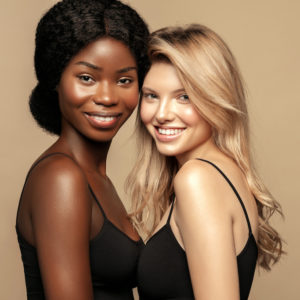CNC’s Big Beauty Weekend: Moving towards a sustainable beauty industry

The Condé Nast College recently hosted the Big Beauty Weekend and one of the highlights of the first day was a British Beauty Council panel discussion, which explored the topic “moving towards a sustainable beauty industry”. This lively Zoom conversation concluded the event’s morning session and saw a fascinating debate between the panel and the popping comments section of the attendees.
The panel was hosted by Elizabeth Barnett Lawton, British Beauty Council Education Pillar President. Alongside Elizabeth was Jayn Sterland, BBC Sustainable Beauty Coalition Chair & MD at Weleda, Sian Sutherland, Chief Change Maker at A Plastic Planet and Phil Cumming, Head of Sustainability at Walgreen Boots Alliance.
View this post on Instagram
The scale of the plastic problem
The debate was opened by the examination of the current status of the planet and the role the beauty industry has to play. The world is currently in a state of climate emergency where Sian Sterland used the analogy of “we treat our oceans like a liquid landfill”, a fact borne out by a startling 56% of Brits stating they do not recycle beauty products. This is an ever increasing problem with the volume of plastic the industry utilises, set to treble by 2040. Overall on a wider scale in the UK, we only recycle 9% of all plastics and export a staggering 60% of our plastic waste- as demonstrated when Sian explained how “200 shipping containers of plastic per day were sent to Turkey everyday during the pandemic”.
Packing is the pinch point
The main contributing cause to the climate and carbon crisis is the hyper-consumption of products, which has been fostered through a throw-away culture where consumers have become accustomed to single use plastic-based items. Jayn explained how the essence of the beauty industry is simple, yet the pinch point is the packaging of products – as 40% of all plastic is used in packaging and has become integral to the product and the overall manner in which the product is graded or valued.
View this post on Instagram
Sian further developed this idea explaining how as human beings we use figures to fool and numb ourselves to the impact our choices are having on the environment. Namely, when using the example of the government’s attempts to reduce the sales of single use plastic bags in 2015, through the introduction of a 5p levy, which has since increased. Although there may have been reports of “95% less bags sold in UK supermarkets, this does not take into account the thick plastic bags we chuck” instead, which are designed for repeated usage.
A shift in consumer mindset
A way to combat this is to alter the mindset of the customer. Instead of looking at the primary function of the plastic bag to take the groceries home, the purpose should be the secondary one. For example, this is seen with the Co-op introducing recyclable shopping bags, which double as food waste caddy liners.
View this post on Instagram
However, the panel goes on to explain it is not an ignorance on the consumer’s part with 41% of consumers feeling guilty about the impact of their beauty product usage on the environment. This presents the consciousness of a new woke consumer who is aware that there are consequences linked to their product choice. Instead it is a lack of choice offered by the brands that is the issue and that “brands need to think about everything and look at their entire supply and production chain”. A growing awareness from the consumer will mean that ethical policy and consideration will be forced onto brand agendas, to meet the needs of consumers.
A collaborative solution
A collaborative approach is necessary to make a sizeable change, which is possible. Sian recommends that “it is the industry’s job to sell something different and the government’s job to do something different” in order to enforce a better standard of product acceptability. Further to this, a change is required which can be scaled to fulfil the needs of the consumer – whether that is choice editing or consumer editing. Jayn explains how “we have to become purpose led” and the objective of a business cannot solely be to make money. Innovation within the industry is the best way for this to be achieved, but essential to this is the need to share the innovation and technology
Sian closed the debate on these poignant takeaways, “newness for newness sake must stop” and “we will never have enough of something we don’t need”, we need to “buy less and buy better”.
Discover what it is like to study on the Vogue Foundation Programme
